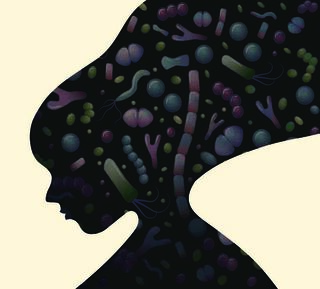SSRIs
Why Antidepressants and Probiotics Could Be a Potent Pairing
Boosting gut health, and carrying few risks.
Posted August 28, 2022 Reviewed by Lybi Ma
Key points
- Psychobiotics are bacteria that can improve your mood.
- Clinical trials are just starting for psychobiotics as treatment options.
- As adjuncts to antidepressants, psychobiotics are showing value.

Psychiatry is becoming more aware of the power of probiotics to improve mood. Nevertheless, most psychiatrists are wary of replacing antidepressants with probiotics until more clinical research is completed.
But how about probiotics as an adjunct? A new study by Anna-Chiara Schaub and colleagues tested that proposition. What they found should put psychiatrists on the alert.
Their study took patients with major depressive disorder and split them into two groups: one getting a probiotic and another getting a placebo. All stayed on their current antidepressants. After a month, the group taking probiotics had a significant improvement in their mood, compared to placebo.
As the researchers put it, “Our results suggest that an add-on probiotic treatment improves depressive symptoms and increases specific health-related bacterial taxa. On a neural level, probiotics alter negative biases and emotional valence additionally to treatment-as-usual for depression.”
Probiotics that can improve mood are called psychobiotics, and the main constituent of the probiotic used in the study was Lactobacillus, a well-known psychobiotic. This study tracks with a meta-analysis done in 2021 that also showed a large improvement when pairing antidepressants with probiotics.
How Does It Work?
How can microbes improve depression? A lot of it has to do with how they help to repair leaky guts. Some researchers dislike that term, because the gut lining is actually designed to leak a bit: that’s how nutrients are absorbed.
The term may be imprecise, but it is certainly evocative. Pathogens can destroy the mucus layer and erode the gossamer gut lining over time. That can allow pathogens and their toxins to enter the bloodstream. The heart then blithely pumps them to every organ in the body, sparking an immune war, where inflammatory cells are recruited to chase down and kill the pathogens. That response will wipe out the intruders and return things to normal, assuming the gut heals.
If the leakiness persists, chronic systemic inflammation can result. Scientists now realize that most chronic diseases start this way, with bacteria wreaking damage on various organs—including the brain. As Hippocrates noted, “All disease starts in the gut.”
Probiotic microbes produce butyrate, which both nourishes and heals the intestinal lining. That decreases the odds of a leaky gut and stops inflammation.
Calming the Immune System
Some bacteria can activate interleukins that temper inflammation. This is because these microbes insinuated themselves early in your development, and they educated your immune system to give them a permanent pass. When your immune system sees them, it treats them as old buddies and dials back inflammation.
Bad bacteria have the opposite effect, kick-starting an inflammatory response designed to decisively wipe them out. In its zeal, the immune system creates a lot of collateral damage, often making the situation worse. Still, bacterial infections can kill, so some damage is the price we pay. The immune response does its best to keep our system in equilibrium, but sometimes the choices are stark.
Psychobiotic microbes produce BDNF, a chemical that encourages the growth of new brain cells. They also produce neurotransmitters like GABA, dopamine, and serotonin. These various microbial secretions have major effects on the health of the brain and may explain how they support antidepressants.
Keeping Track
It can be tricky to tell the good bacteria from the bad, because a lot of supposedly bad bacteria are fine neighbors when their numbers are kept in check. Nevertheless, we can list a few of the main actors.
The good bacteria:
- Bifidobacterium
- Lactobacillus
- Faecalibacterium
- Akkermansia
- Dialister
Bad bacteria:
- Streptococcus
- Klebsiella
- Oscillibacter
- Allistipes
- Lachnospiraceae
- Turicibacter
- Paraprevotella
Among the good bacteria are familiar probiotics like Lactobacillus and Bifidobacteria, found in yogurt, kefir, krauts, and other ferments. Specific species of these genera are also psychobiotics. Eating fermented foods is a popular way to get probiotics.
If you are depressed, whether or not you are on antidepressants, there is very little downside to taking probiotic or prebiotic supplements. At the very least, they can soothe your gut and protect against dozens of chronic inflammatory diseases. The odds are good that they can also help improve your mood. It’s low risk, inexpensive, easy, and there is no stigma attached. Talk to your doctor; she is likely to give you a thumbs up. And that could put a smile on your face.
Facebook/LinkedIn image: fizkes/Shutterstock
References
“Schaub et al. - 2022 - Clinical, Gut Microbial and Neural Effects of a Pr.Pdf.” Accessed August 21, 2022.
Nikolova, Viktoriya L., Anthony J. Cleare, Allan H. Young, and James M. Stone. “Updated Review and Meta-Analysis of Probiotics for the Treatment of Clinical Depression: Adjunctive vs. Stand-Alone Treatment.” Journal of Clinical Medicine 10, no. 4 (February 8, 2021): 647.
Yong, Shin Jie, Tommy Tong, Jactty Chew, and Wei Ling Lim. “Antidepressive Mechanisms of Probiotics and Their Therapeutic Potential.” Frontiers in Neuroscience 13 (January 14, 2020): 1361.




